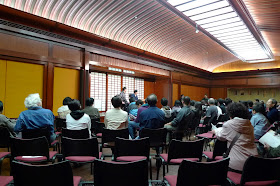As if erhu had gained sudden recognition to become a major musical instrument, there were three notable erhu concerts in Hong Kong in December 2010. The concerts were centred around three major erhu players, who have longed been popularly regarded as masters of the instrument. This often abused crowning of the word "master" whether on music, art, performers in the city is alarming. However, without such naming, attentions to reviews from readers are less focused, or that any writer might be seen as disrespectful. Therefore, here we are, following the practice at least to get more attention, talking about concerts of erhu masters.
Xiao's concert programme.
Of the three musicians, let's begin with Xiao Bai-yong (蕭白鏞). The concert was hosted by Hou Shih-chien (霍世潔), his ex-wife and once student, who also played a title in sub-standard level with her students. This understandably clocked in higher attandance rate that evening. Apart from this interference, Xiao played 14 titles including 7 with yexing and 1 with piano, whilst all others as solo. The repetiore played was written by Liu Tian-hua (劉天華) and Hua Yan-jun (華彥鈞-阿炳), two very important erhu writers in the first half of the last century.
Xiao's control of the instrument was flawless and exceptionally fluent. With his demeanour consistently inert, it demonstrated his exceptional skills and control of the instrument. Although lacking in spark and rather clinical at times, his performance was definitely musical and very engagement up to his last stroke of the bow.
Wong On-yuen (黃安源), Wong Sun-tat (黃晨達) concert leaflet and programme.
Wong On-yuen (黃安源) and his son Wong Sun-tat (黃晨達) played at Nan Lian Garden. The venue, Xuan Hai Xuan (香海軒), could only house a few hundred audiences but it was well decorated in restrained oriental style and the atmosphere for holding concert was excellent.
Like Xiao Bai-yong, the concert was based on erhu classics and traditional canons. There were solo performances by both players and group performances with pipa musician Yu Jia (俞嘉). Wong On-yuen played beautifully and strong with musical characters. There were soft lyrical string plays and driving outbursts that touched the human heart from his performance. Wong Sun-tat also played a significant role in the concert with 2 titles on his own. However, Torrents of River (江河水) was performed without conviction and was rash at times. His version of Reflections of the Moon on the Waters (二泉映月) was superficial on interpretation of sadness and self-pity. Wong the junior even concocted unwanted noise from bow accidentally touching the string at the end of play. It was registered on his face that he was not pleased with his own performance. One would understand that his father's achievement is difficult to surpass, a mountain almost insurmountable. The concert ended in three rounds of applause, quite common in Hong Kong, not necessarily expressing appreciation of music but anticipation of extra performances. To most audience's surprise, encore was not to be forthcoming.
Xu Ke (許可) concert leaflet and programme.
The third concert, held in the same venue above, was performed by Xu Ke (許可). The programme had thoughtful selection of traditional pieces, lesser known titles related to the earthy northern region of China and a short piece by Xu. The mixture had an aura of rural living, one can almost smell an air of countryside and voices of ethnic peoples through the cunning play of erhu. The miming of animal noises, cheesy at times in other Chinese music performances, was restrained yet colourful enough.
Xu's play on the whole was relaxed but truly masterful, a class of his own. A few songs are worthy of mention. Never have I heard Reflections of the Moon on the Waters (二泉映月) played in a slight but noticeable upbeat pace. Why not, since the song was at times played by its original blind author in improvised fashion while peddling merchandises on the streets. This tune was used as a means to attract business. It was only a popular false impression that the tune required an expression of self-pitiness. Xu's version was levels ahead of play by Wong. Xu's own works Enjoy the Country (鄉間喜悅) was rich in texture and fluid in its short duration. It is noted that Xu's deliberately setting of the nut (qianjin 千斤) much higher than usual erhu musicians facilitates wider range of notes to be played. This clearly benefited the rich expressions of sound but on the other hand exceptional skills is required. Apart from the music, he captivated the audience with his gentle swinging movement. It was a convincing demonstration of confidence, dedication and self fulfillment.
As an end note, it had been a great joy to hear Wang Wen-li (王文禮) on yangqin that complimented Xu's erhu on the duo plays. The sound of yangqin was never as beautiful in full scale orchestral performances. The duet was a seamless combination like a breath of fresh air. It reminded one of European chamber music set in perfect harmony with the venue.
Listen to Xu Ke playing Czardas and be convinced (do not be distracted by his outfit):
Xu Ke (許可) and Wang Wen-li (王文禮) at meet-the-artist session after the concert.
The concert set in the beautiful venue of Xuan Hai Xuan (香海軒).
Typical animated gesture of Xu Ke (許可) that captures attention.







No comments:
Post a Comment